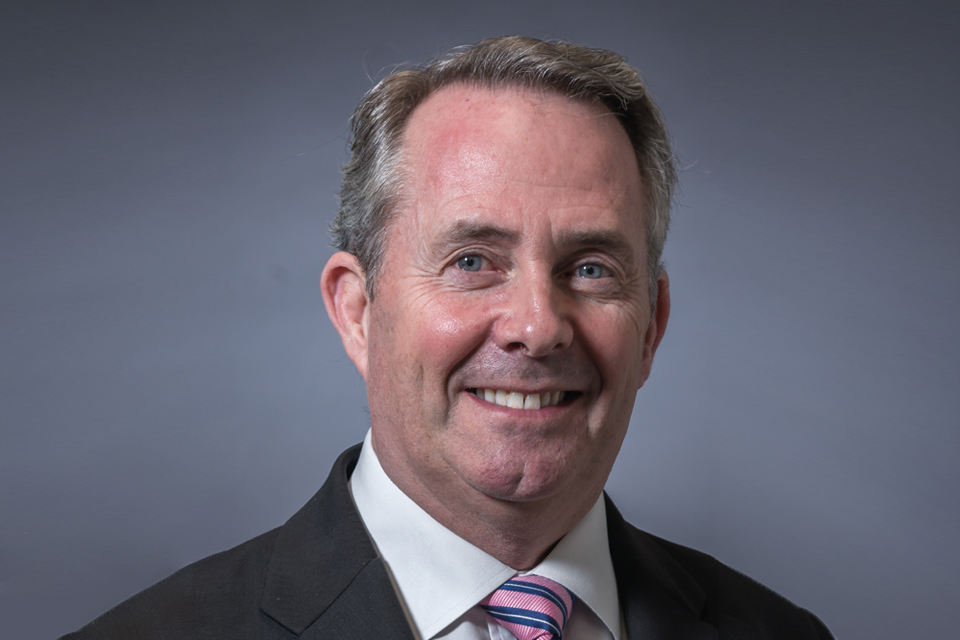Dr Liam Fox challenges anti-free trade myths
In a speech at Speaker’s House, the International Trade Secretary will call on people across the country to be bold and optimistic in promoting the benefits of free trade.

International Trade Secretary and President of the Board of Trade, Dr Liam Fox MP will today call on people across the country to be bold and optimistic in promoting the benefits of free trade.
In a lecture at the Speaker’s House today (Monday 30 April), he will say that people need to stand up and challenge the myths about free trade.
Making a specific address to colleagues at the event in Parliament, he will ask them to show leadership because they have a responsibility to future generations to make the case for a liberalised, global trading system.
The speech marks the beginning of a long-term drive that will speak to the British public, consumers, businesses and global investors over the coming months. This is a debate that Liam Fox wants to take place in households across the country.
He will say that for too long the argument has been focused on misleading claims about food standards. Instead he wants to shift the focus of the debate onto the opportunities the global market can bring: for example increased UK exports of pharmaceutical drugs to poverty ridden countries.
Dr Liam Fox MP, International Trade Secretary is expected to say:
It would be a major political mistake to assume that the case for free trade is so self-evident that it does not require champions today. We have seen the way in which trade agreements such as the EU’s proposed agreement with United States (TTIP) produced violent reactions, however carefully orchestrated, in traditionally free-trade countries such as Germany.
We need to distinguish between the violent anti-capitalists and the legitimate concerns of those worried about the effects that free trade and the development of new technologies may have on their own jobs and communities.
We need people – to confront the myths and wilful distortions perpetuated by the anti-trade lobby.
It is not only our democratic duty but our responsibility for the generations to come to build the case for free trade by making coherent arguments that are attractive across the political spectrum.
On increasing consumer choice, he is expected to say:
If we’re not willing to take head-on the deceptions of the anti-trade lobby then we will deny to future generations, including those in developing countries, the benefits of free trade that we ourselves have enjoyed with improved living standards, improved safety and reliability of goods and improve choice for consumers.
We can all see the benefits of greater choice, greater competition and lower prices in the vast array of goods in our shops and supermarkets where traditional seasonal provision has given way to year-round availability of an increasingly wide selection of produce - from quality Sauvignon Blanc from New Zealand or coffee from South America. We are also seeing increasing demand for global goods with the growth of world food aisles and the popularity of superstores like Whole Foods and Aldi.
He is also expected to say:
…I believe that trade is one of the means by which we can spread prosperity. That prosperity underpins social cohesion and that in turn underpins political stability. That political stability in its turn provides the building blocks of our collective security. It is a continuum that cannot be broken in one part without affecting the rest.
This is why we must take head-on the destructive arguments of the anti-trade lobby whose narrative is that free trade is nothing more than a global corporate conspiracy, a front for their wider ideological anti-capitalist agenda.
They peddle the irresponsible myths that agreements such as the new EU trade agreement with Canada, CETA, will result in reduced protection for workers, a degradation of food and environmental standards and the forced privatisation of organisations like our NHS. Such false claims are as dangerous as they are pernicious.
Further information
- contact the DIT Media and Digital Team on 020 7008 3333 / 0207 215 2000 (out of hours)
- follow us: @tradegovuk, gov.uk/dit